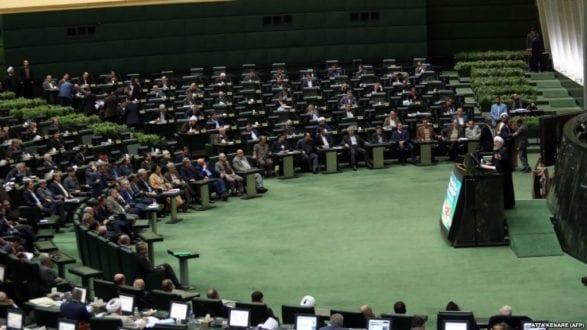iranintl – Iran’s electoral system and its impact on governance have come under scrutiny this week, with both conservative and reformist commentators highlighting its problems.
Iran’s electoral system and its impact on governance have come under scrutiny this week, with both conservative and reformist commentators highlighting its problems.
Reformist commentator Abbas Abdi criticized the government’s approach to the annual budget, noting that the Raisi Administration tends to present bills “for approval” rather than inviting parliamentary review. He argued that the recent rejection of the budget by the Majles (parliament) was a message to the government that parliament should have a say in bills presented.
Abdi also stated that by rejecting the budget bill, the parliament (Majles) wanted to make it known to the government that it has a say and can decide the fate of bills handed over by the government.
He pointed out that the development showed efforts for the unification of the government and parliament within a consolidated ultraconservative governing clique have remained futile.
The commentator was referring to efforts since 2020 to eliminate those who do not belong to the hardliner camp from positions of power. Majles is dominated by ultraconservatives, who also have a strong presence in the presidential administration.
Abdi explained that because of the nature of Iran’s parliamentary system, with no political parties governing the legislature, every lawmaker imposes a heavy burden on the budget to meet their own local and factional interests.

The dynamics between the parliament and the government is badly affected by the two factors of corruption and inefficiency, Abdi maintained, adding that rejecting the budget bill will not solve any problem. “Basically, the current parliament is unable to solve the problem between the two bodies and it needs to find another way to solve the dispute,” headed.
Conservative commentator Nasser Imani, during a debate on Khabar Online, argued that Iran’s electoral system fails to produce an efficient parliament. He noted the absence of political parties in Iran and the restrictions they face, especially since 2020 when many reformist and moderate candidates were disqualified.
Imani said, “Practically, we do not have any political parties in Iran. Those that exit are not allowed to have any election-related activity other than presenting a list of candidates ahead of every election.”
In fact, even that has not been possible since 2020 when reformist and moderate candidates were effectively barred from taking part in elections as nearly all of their well-known candidates were disqualified either by the Interior Ministry or the Guardian Council.
“When we do not have political parties we cannot expect a lively election mood, and we cannot even ensure that the government has a mechanism to listen to the people and their demands,” Imani said. He argued that “We have a parliament in which political parties are not represented. This is unprecedented in the world’s parliamentary systems. In the absence of political parties with defined plans and platforms, unknown figures with little if any qualifications find their way to the parliament and then they have to discuss key issues such as annual budget.”
Meanwhile, Mohammad Atrianfar, who was debating Imani, called for changes to reverse the current trajectory. “If we conclude that we cannot return from that wrong path, then we have to accept that there is no way for reform-minded people like me to participate in political activities in Iran.”
Atrianfar argued that “If we want to be politically active, there are only three ways ahead of us: Either we should take action for a regime change, or we need to call for reforms. The third way is just to be passive.”
He argued that reforms aim to improve the situation and cited former President Hassan Rouhani as an example of someone with a conservative background who pursued reformist goals by working to improve the country’s situation.
In summary, many conservative and reformist commentators in Iran are critical of the country’s electoral system, citing issues related to the budget, the absence of political parties, and the need for reforms to address governance challenges.
Iran’s electoral system and its impact on governance have come under scrutiny this week, with both conservative and reformist commentators highlighting its problems.
Reformist commentator Abbas Abdi criticized the government’s approach to the annual budget, noting that the Raisi Administration tends to present bills “for approval” rather than inviting parliamentary review. He argued that the recent rejection of the budget by the Majles (parliament) was a message to the government that parliament should have a say in bills presented.
Abdi also stated that by rejecting the budget bill, the parliament (Majles) wanted to make it known to the government that it has a say and can decide the fate of bills handed over by the government.
He pointed out that the development showed efforts for the unification of the government and parliament within a consolidated ultraconservative governing clique have remained futile.
The commentator was referring to efforts since 2020 to eliminate those who do not belong to the hardliner camp from positions of power. Majles is dominated by ultraconservatives, who also have a strong presence in the presidential administration.
Abdi explained that because of the nature of Iran’s parliamentary system, with no political parties governing the legislature, every lawmaker imposes a heavy burden on the budget to meet their own local and factional interests.

The dynamics between the parliament and the government is badly affected by the two factors of corruption and inefficiency, Abdi maintained, adding that rejecting the budget bill will not solve any problem. “Basically, the current parliament is unable to solve the problem between the two bodies and it needs to find another way to solve the dispute,” headed.
Conservative commentator Nasser Imani, during a debate on Khabar Online, argued that Iran’s electoral system fails to produce an efficient parliament. He noted the absence of political parties in Iran and the restrictions they face, especially since 2020 when many reformist and moderate candidates were disqualified.
Imani said, “Practically, we do not have any political parties in Iran. Those that exit are not allowed to have any election-related activity other than presenting a list of candidates ahead of every election.”
In fact, even that has not been possible since 2020 when reformist and moderate candidates were effectively barred from taking part in elections as nearly all of their well-known candidates were disqualified either by the Interior Ministry or the Guardian Council.
“When we do not have political parties we cannot expect a lively election mood, and we cannot even ensure that the government has a mechanism to listen to the people and their demands,” Imani said. He argued that “We have a parliament in which political parties are not represented. This is unprecedented in the world’s parliamentary systems. In the absence of political parties with defined plans and platforms, unknown figures with little if any qualifications find their way to the parliament and then they have to discuss key issues such as annual budget.”
Meanwhile, Mohammad Atrianfar, who was debating Imani, called for changes to reverse the current trajectory. “If we conclude that we cannot return from that wrong path, then we have to accept that there is no way for reform-minded people like me to participate in political activities in Iran.”
Atrianfar argued that “If we want to be politically active, there are only three ways ahead of us: Either we should take action for a regime change, or we need to call for reforms. The third way is just to be passive.”
He argued that reforms aim to improve the situation and cited former President Hassan Rouhani as an example of someone with a conservative background who pursued reformist goals by working to improve the country’s situation.
In summary, many conservative and reformist commentators in Iran are critical of the country’s electoral system, citing issues related to the budget, the absence of political parties, and the need for reforms to address governance challenges.
Iran’s electoral system and its impact on governance have come under scrutiny this week, with both conservative and reformist commentators highlighting its problems.
Reformist commentator Abbas Abdi criticized the government’s approach to the annual budget, noting that the Raisi Administration tends to present bills “for approval” rather than inviting parliamentary review. He argued that the recent rejection of the budget by the Majles (parliament) was a message to the government that parliament should have a say in bills presented.
Abdi also stated that by rejecting the budget bill, the parliament (Majles) wanted to make it known to the government that it has a say and can decide the fate of bills handed over by the government.
He pointed out that the development showed efforts for the unification of the government and parliament within a consolidated ultraconservative governing clique have remained futile.
The commentator was referring to efforts since 2020 to eliminate those who do not belong to the hardliner camp from positions of power. Majles is dominated by ultraconservatives, who also have a strong presence in the presidential administration.
Abdi explained that because of the nature of Iran’s parliamentary system, with no political parties governing the legislature, every lawmaker imposes a heavy burden on the budget to meet their own local and factional interests.
The dynamics between the parliament and the government is badly affected by the two factors of corruption and inefficiency, Abdi maintained, adding that rejecting the budget bill will not solve any problem. “Basically, the current parliament is unable to solve the problem between the two bodies and it needs to find another way to solve the dispute,” headed.
Conservative commentator Nasser Imani, during a debate on Khabar Online, argued that Iran’s electoral system fails to produce an efficient parliament. He noted the absence of political parties in Iran and the restrictions they face, especially since 2020 when many reformist and moderate candidates were disqualified.
Imani said, “Practically, we do not have any political parties in Iran. Those that exit are not allowed to have any election-related activity other than presenting a list of candidates ahead of every election.”
In fact, even that has not been possible since 2020 when reformist and moderate candidates were effectively barred from taking part in elections as nearly all of their well-known candidates were disqualified either by the Interior Ministry or the Guardian Council.
“When we do not have political parties we cannot expect a lively election mood, and we cannot even ensure that the government has a mechanism to listen to the people and their demands,” Imani said. He argued that “We have a parliament in which political parties are not represented. This is unprecedented in the world’s parliamentary systems. In the absence of political parties with defined plans and platforms, unknown figures with little if any qualifications find their way to the parliament and then they have to discuss key issues such as annual budget.”
Meanwhile, Mohammad Atrianfar, who was debating Imani, called for changes to reverse the current trajectory. “If we conclude that we cannot return from that wrong path, then we have to accept that there is no way for reform-minded people like me to participate in political activities in Iran.”
Atrianfar argued that “If we want to be politically active, there are only three ways ahead of us: Either we should take action for a regime change, or we need to call for reforms. The third way is just to be passive.”
He argued that reforms aim to improve the situation and cited former President Hassan Rouhani as an example of someone with a conservative background who pursued reformist goals by working to improve the country’s situation.
In summary, many conservative and reformist commentators in Iran are critical of the country’s electoral system, citing issues related to the budget, the absence of political parties, and the need for reforms to address governance challenges.
 Shabtabnews In this dark night, I have lost my way – Arise from a corner, oh you the star of guidance.
Shabtabnews In this dark night, I have lost my way – Arise from a corner, oh you the star of guidance.



